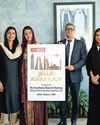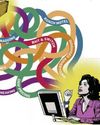
Over a decade ago, when Madhumita Murgia was starting out in journalism (she had studied biology and clinical immunology at Oxford and then worked on developing vaccines for HIV), she became curious about the world of data brokering—where shadowy companies “collect data about our online lives and turn them into saleable profiles of who we are today, and who we will one day become”. To make the story more tangible, she decided to track down the profile of someone she was intimately familiar with— herself. She contacted an ad-tech startup to decode the information collected about her from her own web browser. The report they sent her of an ‘anonymised version' of herself included her profile put together by Experian, a credit-rating agency that doubled as a data broker.
The report was shocking, not just because of the personal details it contained—from where she worked and lived and how she spent her money to the holidays she had taken in the past year—but also because it detailed her opinions, interests, and personality traits, from her TV-watching habits and food preferences to her level of ambition and political leanings.
This was really her baptism into the murky world of data colonialism, big tech, surveillance, and artificial intelligence. “My life—and yours—is being converted into such a data package that is then sold on,” she writes in her new book, Code Dependent: Living in the Shadow of AI. “Ultimately, we are the products.”
This story is from the May 19, 2024 edition of THE WEEK India.
Start your 7-day Magzter GOLD free trial to access thousands of curated premium stories, and 9,000+ magazines and newspapers.
Already a subscriber ? Sign In
This story is from the May 19, 2024 edition of THE WEEK India.
Start your 7-day Magzter GOLD free trial to access thousands of curated premium stories, and 9,000+ magazines and newspapers.
Already a subscriber? Sign In

Lessons in leadership
When I began my career at Hindustan Lever (as HUL was then called), I was deeply inspired by our chairman, Dr Ashok S. Ganguly.

Political colours
One of the greatest fashion statements of recent times was made in the Parliament's winter session by Rahul Gandhi and some opposition colleagues. India's most news-making politician (since his landmark Bharat Jodo Yatra) gave up his signature white polo T-shirt for a blue one.

Chat roam
Vox pop content is seeing an uptick in India, with creators making conversations on current and social issues fun and funny

Back home with BANNG
Michelin star-winning chef Garima Arora, who recently opened her first restaurant in India, on all things food and family

One supercalifragilisticexpialidocious New Year
Once Christmas is over, tension mounts in our home as the little woman and I start ticking off the days. We both remain on edge because we dread the coming of the New Year—a time when the whole world goes crazy and adopts resolutions. We, too, make New Year promises and our ‘list of past resolutions’ is very long and impressive. Unfortunately, we are complete failures at keeping them and our ‘list of resolutions not kept’ is equally long and equally impressive.

Six or out?
Cricket is a quasi-religion in India. And our pantheon of cricketers is worshipped with a fervour bordering on hysteria.

DOWN AND UNDER THE WEATHER
After their flop show in Australia, Virat Kohli and Rohit Sharma will have to live on current form rather than past glory

The new in news
THE WEEK and DataLEADS partner to revolutionise news with fact-checks, data and Live Journalism

Hello Middle East
Reem Al-Hashimy, UAE minister of state for international cooperation, inaugurates a special Middle East section on THE WEEK website

BAIT CLICK
Dark patterns fool millions of Indians every day. The government is finally acting, but it just may not be enough